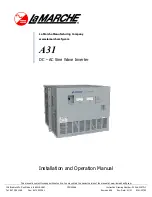
Note
If Open Transducer Detect (OTD) is enabled when
*CAL?
is executed, the module
will disable OTD, wait 1 minute to allow channels to settle, perform the calibration,
and then re-enable OTD. If your program turns off OTD before executing
*CAL?
, it
should also wait 1 minute for settling.
*CLS
Clear Status Command. The
*CLS
command clears all status event registers
(Standard Event Status Event Register, Standard Operation Status Event Register,
Questionable Data Event Register) and the instrument’s error queue. This clears the
corresponding summary bits (bits 3, 5, and 7) in the Status Byte Register.
*CLS
does not affect the enable bits in any of the status register groups. (The SCPI
command
STATus:PRESet
does clear the Operation Status Enable and Questionable
Data Enable Registers.)
*CLS
disables the Operation Complete function (
*OPC
command) and the Operation Complete Query function (
*OPC?
command).
*DMC <
name
>,<
cmd_data
>
Define Macro Command. Assigns one, or a sequence of commands to a named
macro.
The command sequence may be composed of SCPI and/or Common Commands.
<
name
>
may be the same as a SCPI command, but may not be the same as a
common command. When a SCPI named macro is executed, the macro rather than
the SCPI command is executed. To regain the function of the SCPI command,
execute *EMC 0.
<
cmd_data
>
is sent as arbitrary block program data. For more information see
page 156.
*EMC
Enable Macro Command. When
<
enable
>
is non-zero, macros are enabled.
When
<
enable
>
is zero, macros are disabled.
*EMC?
Enable Macro Query. Returns either
1
(macros are enabled),
or
0
(macros are disabled).
Common Command Reference
276 HP E1313/E1413 Command Reference
Chapter 5
Artisan Technology Group - Quality Instrumentation ... Guaranteed | (888) 88-SOURCE | www.artisantg.com
















































